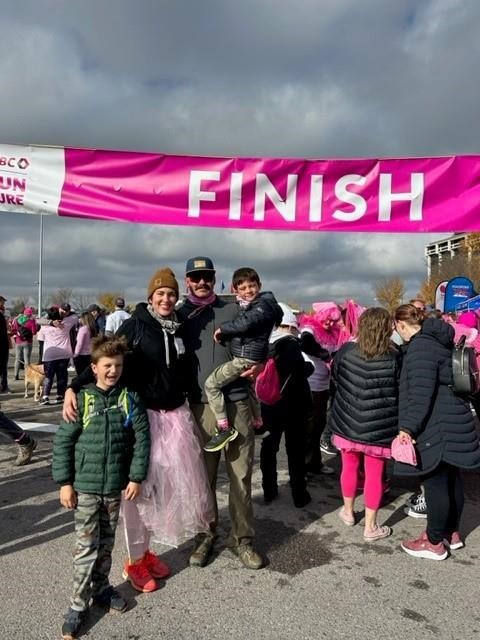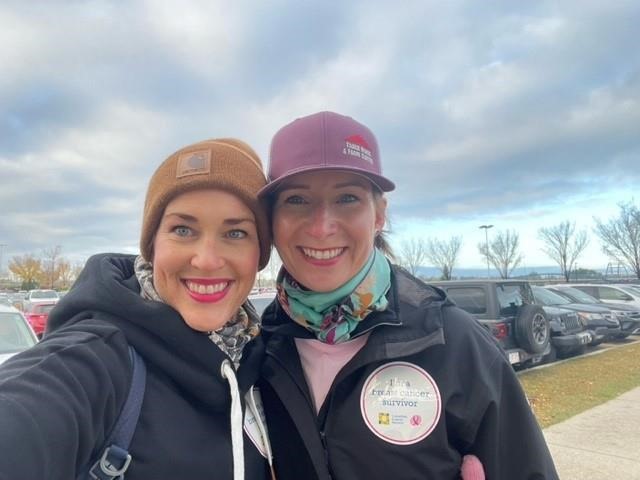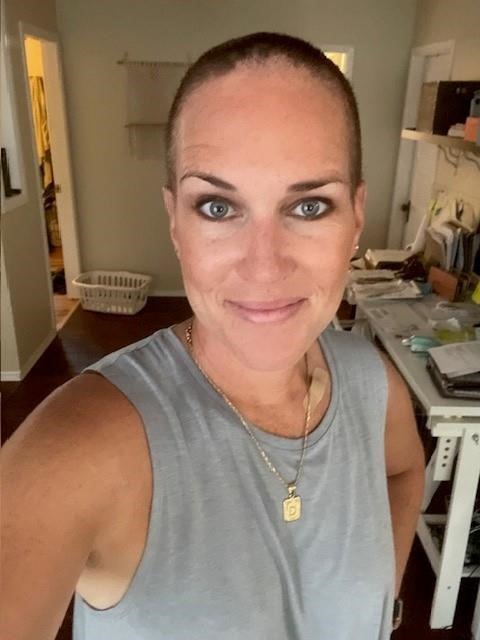Jaclinn McNiven’s journey started in 2022
By Diego Flammini
Staff Writer
Farms.com
Raising a family, managing a farm and preparing to move about three hours away from a best friend would likely be enough for one person to handle on any given day.
But that’s also the day Jaclinn McNiven found out she had breast cancer.
“It was July 12 of 2022. We were packed up and I was saying goodbye to my best friend, and that’s when I got a call from my doctor telling me I should come in that afternoon,” she told Farms.com. “It was obviously heartbreaking.”
McNiven’s family has a history of breast cancer as her mom had it too.
The risk of developing breast cancer is higher in women who have a first-degree relative (mother, sister, or daughter) who had it too, the Canadian Cancer Society says.
Knowing she was at higher risk, McNiven started making regular breast cancer screenings part of her health plan at age 38. That’s two years before the Canadian Cancer Society’s recommendations for beginning to have breast cancer discussions with a doctor.
“I kept having to go every six months for mammograms and ultrasounds because the doctors kept seeing a shadow,” she said. “It got missed and the tumor was about an inch big. It was really disappointing because I tried to be so diligent.”
McNiven's doctor noticed something abnormal about her breasts.
“I never felt a thing,” she said. “They were naturally lumpy as dense breasts are. I could never feel the lump but my surgeon could right away. That's why I want to push for MRI screenings for young high-risk females."
After finding out she had breast cancer, McNiven had to wait 10 days before seeing a surgeon to find out what kind she had.
“It was such an awful place to be,” said McNiven, now 43. “I definitely went down a dark slide. I looked at my two boys and started to wonder, ‘what if this doesn’t work out?’ And my husband would tell me it has to work out because he needs me.”

The McNiven family (From left: Roland, Jaclinn, Daniel and Sullivan).
Doctors diagnosed her with triple-negative breast cancer in Stage 2.
Triple-negative means the cancer doesn’t have any receptors for a protein called HER2, which helps breast cancer cells grow quickly. The cancer also doesn’t have any progesterone or estrogen receptors.
“Because it doesn’t have any of these receptors, triple-negative breast cancer is considered a separate type of breast cancer with its own treatment options,” the Canadian Cancer Society says, adding this kind of cancer is aggressive and can spread quickly.
Almost two weeks passed before McNiven met with her oncologist.
She felt angry because she felt she shouldn’t be in this situation and didn’t have clarity about the next steps, which the oncologist provided.
“The oncologist gave me a plan and that’s really what I needed,” McNiven said. “The doctors are the ones telling you what’s happening and what’s happening next. It just took so long to get there and that was really hard for me.”
McNiven’s treatment began Aug. 5, with weekly chemotherapy appointments.
She also qualified for neoadjuvant chemotherapy, which is designed to shrink the tumour before starting other treatments. She had those appointments every three weeks.
“It’s your own body saying, ‘hey, these cancer cells are bad, you have to attack them,’ so your body is attacking itself,” she said. “It slammed me into severe Hashimoto’s (thyroiditis).”

Jaclinn McNiven and Katie Cowie.
Katie Cowie shared her breast cancer story with Farms.com last year.
This condition causes a person’s thyroid to not make enough thyroid hormone, which controls the body’s metabolism.
In the background of McNiven’s treatments, the grain farm in Chinook, Alta. needed attention and a new family home was under construction.
Family members and friends played a pivotal role in supporting McNiven and allowing her husband, Daniel, to be with her at the appointments.
“Some of our friends had an old farmhouse that they let us stay in, or the neighbours took the kids if I was feeling ill,” she said. “The community was amazing and my family was a big help."
In addition, McNiven shared her journey on social media.
She didn’t hide the difficult posts, and ended up as a source of inspiration for others.
“What I was showing people was real life and the things I was going through and feeling,” she said. “I’ve had so many people reach out to me with messages saying they’re having mammograms done and advocating for their own health.”

Jaclinn McNiven after shaving her own head.
Surgery followed McNiven’s chemotherapy treatments, where she opted for a double mastectomy and chose to have tissue expanders put in. This allowed her to receive silicone implants.
When she looks in the mirror, she sees a breast cancer survivor – sort of.
“It doesn’t look like me,” she said. “I’ve got more wrinkles and I’ve got arthritis in my hands. And before when I looked down, I was amputated. And now my breasts are bigger than they were before. It’s weird. I still have a hard time saying I even had breast cancer.”
Despite the hardships she went through on this journey, McNiven has realized something about herself.
Anything is possible.
“I went through periods where I was so sick I felt like I was dying,” she said. “But I told myself I was going for a walk, even if it was just around the house. Your mind is so powerful.”
McNiven shared advice for women at the beginning of their breast cancer journeys.
On the days where you don’t feel like doing anything, try to do something.
“You’re going to feel terrible on some days, but you can’t wallow in it,” she said. “You have to get up, and let go of who you were before.”
And it’s okay to accept help.
“People truly want you to get better, and it can be hard to accept help,” she said. “I’m a farmer, right? I want to be hands-on, and do everything by myself. But sometimes you can’t. So just let people help if that’s what they want to do.”
McNiven is now cancer-free and recently participated in the CIBC Run for the Cure, where she raised nearly $1,000.